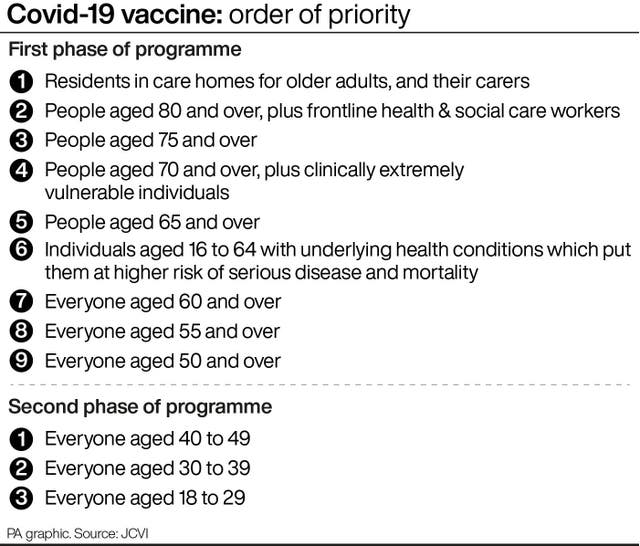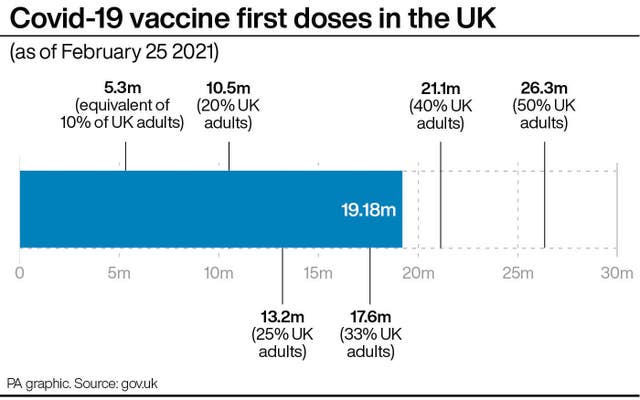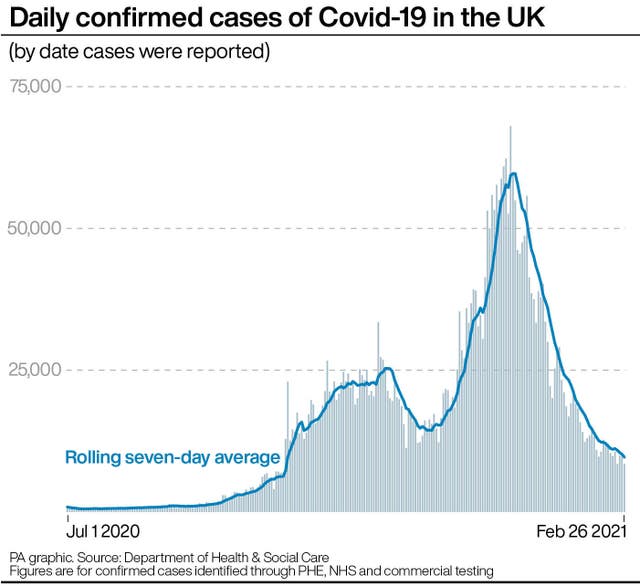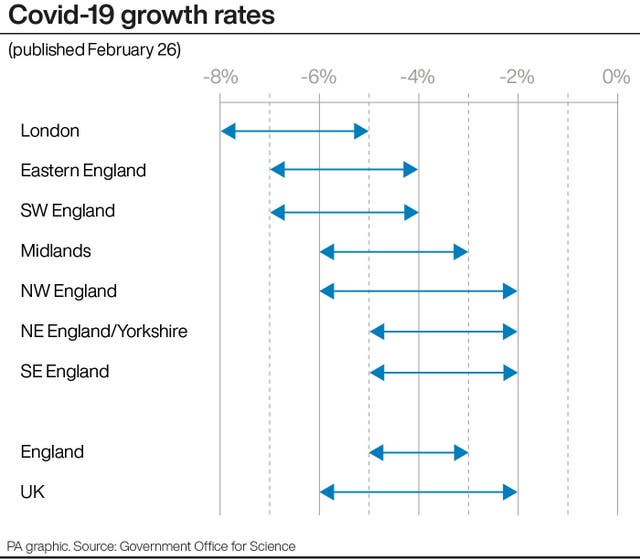Age remains the rule as people 40-49 next in line for Covid-19 vaccines
The Government is sticking with its vaccine policy and groups such as teachers and police officers will not be prioritised for the jab.

People aged 40-49 are next in line for a Covid-19 vaccine after Government advisers concluded that vaccinating in order of age remained the quickest way to cut deaths.
The Joint Committee on Vaccination and Immunisation (JCVI) considered whether groups such as teachers and police officers should be vaccinated next, but concluded speed is of the upmost importance, while age remains a major factor in serious illness.
Professor Wei Shen Lim, Covid-19 chair for the JCVI, told a press briefing that age “remains a dominant factor – it is still one of the most important causes of severe disease, even in those aged 50 years and below”.
He said that even within different occupations, it was older people who are more at risk than those who are younger.
The new guidance means that in phase two of the vaccine rollout, priority will be given in the following order:
– All those aged 40-49
– All those aged 30-39
– All those aged 18-29
These groups will be vaccinated once all those in phase one (the over-50s and most vulnerable) have been offered a jab, with the Government’s target for a first dose in phase one being mid-April.
Prof Lim said one of the difficulties with looking at vaccination according to occupation was that jobs were not very well recorded in GP records.
“Trying to work out the association between occupational risk and exposure and severe disease has been difficult enough, and I think structuring an entire mass vaccination programme around occupation would be even more difficult,” he said.

“We know that an age-based programme is simple and works very well and it seems sensible to continue with that, keeping an eye on speed because speed of deployment is the important factor.”
He said only one week’s advantage may have been gained in terms of the vaccine queue if age bands were sub-divided.
He said the “effort to try and do that may actually slow down the overall programme”.
He added: “Speed is important.
“Of all the different approaches to vaccination, getting vaccines into arms as quickly as possible is the fastest way and the best way to maximise benefit to the population.”
Dr Mary Ramsay, head of immunisations at Public Health England (PHE), told the briefing the age-based approach will ensure more people are protected more quickly.
She said that even within different occupations age was the dominant factor in severe disease, adding: “We would want a 40-year-old policeman to come forward before a 20-year-old policeman.”

She also urged anyone at higher risk from Covid-19, including men and black, Asian and minority ethnic communities, to have a vaccine.
She called on local health systems to ensure they are “fully engaged and reaching out to under-served communities to ensure they can access the vaccine.”
A UK Government spokeswoman said: “All four parts of the UK will follow the recommended approach, subject to the final advice given by the independent expert committee.
“The UK Government remains on course to meet its target to offer a vaccine to all those in the phase one priority groups by mid-April, and all adults by the end of July.”
Reacting to the news, the national chairman of the Police Federation of England and Wales said it was a “deep and damaging betrayal” which “will not be forgotten”.
John Apter told the PA news agency: “There’s real palpable anger from all levels within policing about how we have been completely disregarded and ignored in this phase.
“What is expected of policing does put them at risk. It does put them at risk of transmitting this virus.
“They’re being spat at, coughed at, rolling around on the ground with people, working in hospital environments, going into people’s homes. They can’t mitigate the risk of the virus.
“All of that means absolutely nothing. This is a very deep and damaging betrayal and it will not be forgotten.”
Paul Whiteman, general secretary of school leaders’ union Naht, said school teams “often occupy confined and unventilated spaces for long periods of time with only rudimentary PPE (personal protective equipment).
“The fact that it may have added some complexity to rollout is not a good enough reason not to prioritise the needs of committed professionals.
“A sick teacher is a teacher away from class, which will mean further disruption to pupils’ education and could well mean that they may need to be educated from home again.
“I am amazed by the continuing dedication of school teams. The Government has let them down at every turn.”
But several scientists backed the move, with Jonathan Ball, professor of molecular virology at the University of Nottingham, saying: “We know that these vaccines are good at protecting from serious disease, and the likelihood of that increases with age.
“Therefore, continuing to target vaccine rollout according to disease risk makes sense, especially if this simplifies the rollout process.”

Dr Michael Head, senior research fellow in global health at the University of Southampton, said there was merit in the idea of prioritising groups such as teachers.
“However, the downside is how best to rapidly identify those most at risk among different groups of employees across sectors and efficiently offer them the vaccination,” he added.
“For example, do you just prioritise teachers, or also include bus and taxi driver and security staff?
“If not, then why not and which other job roles do you consider? Where is the dividing line in this risk assessment? It’s not an easy exercise and difficult to get right.
“With such additional complexities, this could simply slow down the rollout and may delay the point that individuals would be offered the vaccine anyway.
“Therefore, on balance, I think this approach from the JCVI is the best way forward.”

On the issue of vaccinating prisoners in one visit, Prof Lim said the JCVI backed local flexibility, while Dr Ramsay said it was important the right “balance” was struck and the programme was seen to be fair and not “disadvantaging another group who might be at high risk”.
However, it comes as a paper released by the Scientific Advisory Group for Emergencies (Sage) on Friday said that people in jobs that can be done from home are less likely to die from coronavirus.
But the Environment Modelling Group highlights age is the highest risk factor associated with death from Covid-19.
According to the February 11 paper: “Occupations that are less likely to be able to work from home have higher Covid-19 mortality rates than those that can work from home.”
It also sets out that someone’s occupation “may have an important impact” on the likelihood they will be exposed to the virus and become infected.
The group further notes: “Key workers mainly in health and social care are more likely to become infected with Covid-19 than non-key workers.”
It also said it is extremely difficult to determine how much coronavirus transmission takes place within the workplace, and how much is associated with related social, household or transport exposures.
In other developments:
– Around one in 145 people in private households in England had Covid-19 between February 13 and 19, according to new estimates from the Office for National Statistics (ONS). This is down from about one in 115 people for the period February 6-12 and is the lowest figure since October 2-8.
– The coronavirus reproduction number, or R value, across the UK is between 0.6 and 0.9, according to the latest Government scientists. This is unchanged since last week.
– Positive attitudes towards the coronavirus vaccine have increased, with 94% of adults saying they have either received the jab or would be likely to have it if offered, ONS figures show.
Meanwhile, Professor Calum Semple, a member of Sage, has said keeping windows open and improving ventilation in schools is much more effective at reducing coronavirus transmission than asking young children to wear face masks.
The Department for Education has said primary schoolchildren should not be asked to wear masks after some schools said they would bring in face coverings.





